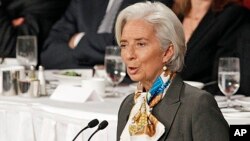NEW YORK —
The head of the International Monetary Fund Wednesday said world financial conditions are improving, but that the gains have not been accompanied by a jump in global growth.
Christine Lagarde said that after what she called a particularly volatile period, financial conditions are showing signs of improvement.
“Thanks to the actions of policy makers, the economic world no longer looks quite as dangerous as it did nine months ago," said Lagarde. "Yet, we do not expect global growth to be much higher this year than last year’s. We are seeing new risks and the legacy of old risks that have not been completely dealt with. In far too many countries, improvements in financial markets have not actually translated into improvements of the real economy - and in the lives of the people.”
The IMF managing director, who is a former French finance minister, made her remarks in a speech to the Economic Club of New York. She said the differences in the world’s regions are also starker than ever - countries doing well, countries on the mend and countries that still have some distance to cover.
Emerging markets and developing countries, she said, are doing well but are worried about the fallout from exceptionally loose monetary policy in the advanced countries. The countries that still have some distance to travel, as she put it, include the Euro area and Japan.
Lagarde put the United States in the middle category - as one of the countries on the mend. She said the U.S. has made rapid and substantial progress in repairing its financial system and there is now steady growth supported by solid financial demand. She warned, however, about the growing U.S. government debt.
“At this point in the recovery, it is more important than ever to put in place a credible, medium-term roadmap to bring down the debt - a balanced plan that will be based on savings in entitlement spending plus additional revenues," she said.
Lagarde said this is a major policy challenge facing the United States, adding that it must be met or the country’s substantial economic gains could be easily lost. U.S. President Barack Obama has submitted a budget calling for reductions in spending on entitlement programs, accompanied by tax increases on wealthy Americans.
Republican leaders have rejected any tax increases.
Christine Lagarde said that after what she called a particularly volatile period, financial conditions are showing signs of improvement.
“Thanks to the actions of policy makers, the economic world no longer looks quite as dangerous as it did nine months ago," said Lagarde. "Yet, we do not expect global growth to be much higher this year than last year’s. We are seeing new risks and the legacy of old risks that have not been completely dealt with. In far too many countries, improvements in financial markets have not actually translated into improvements of the real economy - and in the lives of the people.”
The IMF managing director, who is a former French finance minister, made her remarks in a speech to the Economic Club of New York. She said the differences in the world’s regions are also starker than ever - countries doing well, countries on the mend and countries that still have some distance to cover.
Emerging markets and developing countries, she said, are doing well but are worried about the fallout from exceptionally loose monetary policy in the advanced countries. The countries that still have some distance to travel, as she put it, include the Euro area and Japan.
Lagarde put the United States in the middle category - as one of the countries on the mend. She said the U.S. has made rapid and substantial progress in repairing its financial system and there is now steady growth supported by solid financial demand. She warned, however, about the growing U.S. government debt.
“At this point in the recovery, it is more important than ever to put in place a credible, medium-term roadmap to bring down the debt - a balanced plan that will be based on savings in entitlement spending plus additional revenues," she said.
Lagarde said this is a major policy challenge facing the United States, adding that it must be met or the country’s substantial economic gains could be easily lost. U.S. President Barack Obama has submitted a budget calling for reductions in spending on entitlement programs, accompanied by tax increases on wealthy Americans.
Republican leaders have rejected any tax increases.




